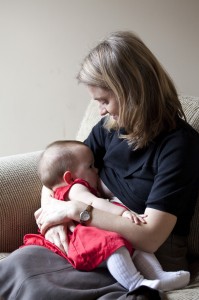Over the past few months breastfeeding has been frequently highlighted in the news. From the Time magazine cover showing a four-year-old breastfeeding, to debates over nursing in public, it seems as if everyone has an opinion on how and when women should breastfeed. Most people agree that breastfeeding a newborn is a good thing, but the conversation quickly turns into a debate when discussing breastfeeding older children.
Extended breastfeeding is defined as breastfeeding beyond the first year. But, before we start criticizing or talking about “psychological harm” to children, let’s take a look at how common extended breastfeeding really is. According to the CDC, only 75% of children are ever breastfed. The rates decreased to 43.8% at 6 months and 22.4% at 1 year. Only 5.7% of children are still breastfeeding at 18 months. If we look at exclusive breastfeeding the numbers drop even further to 33.5 % of children at 3 months and 13.8% of children at 6 months. If only 5% of children are still breastfeeding at 18 months it is logical to assume that a much smaller proportion of children are still breastfeeding at three, four, or even five years of age.
| 6 months | 1year | 18 months | |
| Some breastfeeding | 43.8% | 22.4% | 5.7% |
| Exclusive breastfeeding | 13.8% |
*source: CDC
The American Academy of Pediatrics (AAP) recommends exclusive breastfeeding for about 6 months and continued breastfeeding for 1 year or longer. The World Health Organization (WHO) recommends exclusive breastfeeding for the first 6 months with continued breastfeeding for 2 years or more. You might notice that there is no mention of a cutoff or weaning age. In fact, both groups advise continued breastfeeding for as long as it is beneficial to both mother and child. Given these numbers, I think it is time to stop worrying about the less than 5 % of children who are breastfeeding “too long” and instead start focusing on why more women aren’t initiating breastfeeding and why so many women who start breastfeeding are stopping early.
Breastfeeding is not as easy as many breastfeeding advocates would have us believe. Most women have limited experience even seeing someone else breastfeed before attempting to nurse for the first time. I faced many challenges in the early weeks as my son and I both learned to nurse. From a poor latch, to an allergy to lanolin, and a raging yeast infection, nursing was anything but easy or enjoyable in the beginning. I was fortunate and able to take 12 weeks of maternity leave and was surrounded by a wonderful support system of people. Not every mother is so lucky. When my son was three weeks old I met another mother who was working as a waitress. She mentioned how she really wanted to breastfeed, but found it too challenging with her job. I asked how old her child was and she responded “two weeks.” Her baby was only two weeks old and she had already been back at work for a week! She had no choice, financially her family needed her to work and she did not qualify for paid maternity leave. Sadly, scenarios like this one are all too common.
While FMLA is great in theory, too many women do not qualify and many of those who do qualify work for companies where the leave is unpaid. We need to ensure that all women who want to breastfeed are given the tools they need to succeed. This means implementing more baby friendly practices in hospitals, increasing the access to paid maternity leave, and supporting women who need to pump in the work place. We need to stop criticizing women who are breastfeeding and start celebrating the successful breastfeeding relationships around us.






aloha, from Hidden Hills, California I want to tell you, I like this blog. However, it is strange how I ended up on your website. I searched for prices for a party bus on Yahoo and ended up on your website. I must say I do like your site and will check back soon. But I need to find the limo I was originally looking for first. Have a amazing day! Bye.